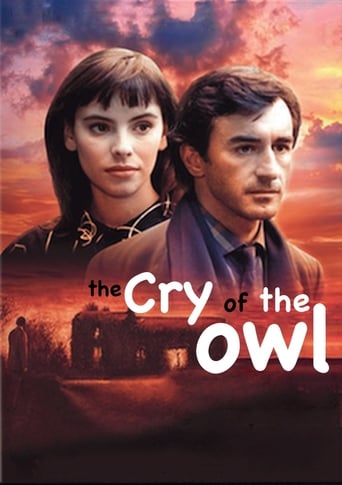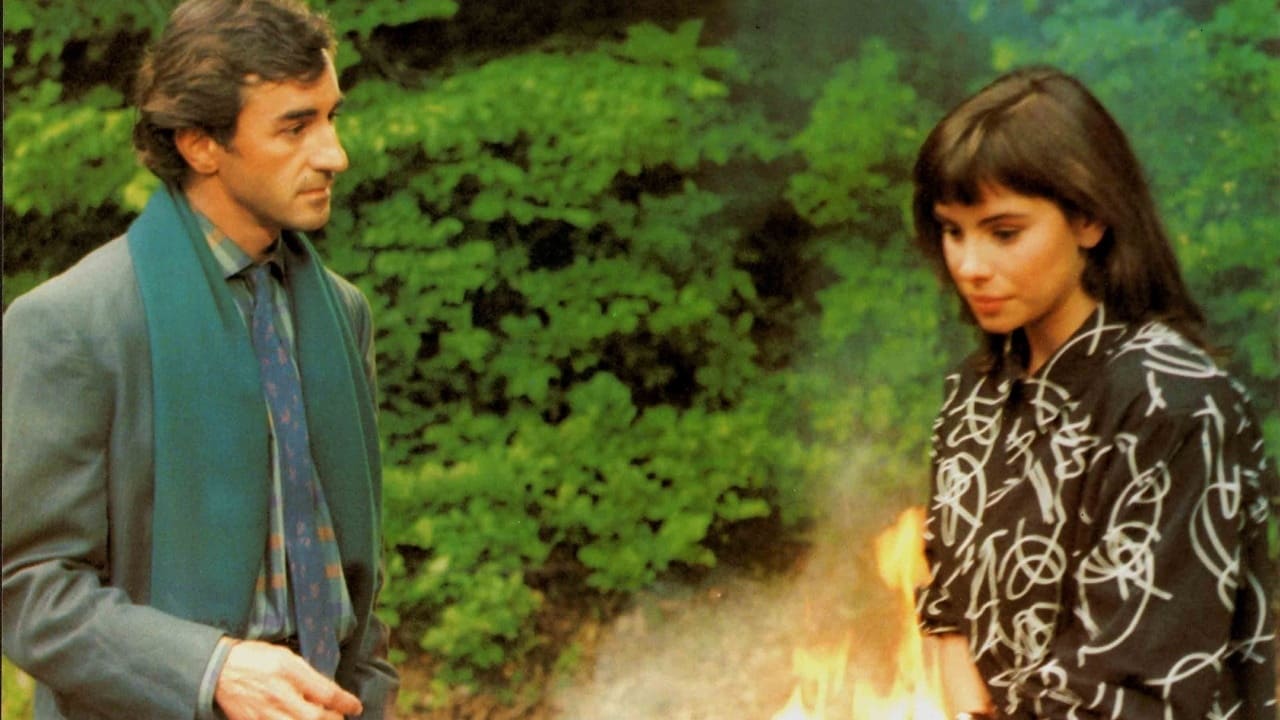jotix100
Robert an architect and artist finds himself working in Vichy. We watch him as the story begins, watching surreptitiously a young and attractive woman living in an ivied covered house in a forested area. Juliette, the woman of the house, senses she is being watched, although she has no basis for her suspicion. Juliette has a strange relationship with Patrick, a pharmaceutical salesman who travels in the region.One day, Robert is bold enough to show up at Juliette's door. She is curious, realizing he might be the presence she felt on the other side of her fence. She feels attracted to the handsome Robert, who happens to be separated from Veronique, a vulgar wife in Paris. Patrick becomes jealous watching his girlfriend's attentions on Patrick. Robert, in turn has had mental problems and had been treated for his condition, now being in better mental health. Juliette clearly fancies Robert.After a road confrontation where Patrick has been following Robert and Juliette, as he is taking her home, the two men fight. Patrick and Robert end up by a river, where Patrick lands after being hit. Robert fishes him out so he does not drown. Patrick is reported missing and the local police becomes involved. What no one realizes is that Patrick has sided with Robert's estranged wife in order to create trouble for the architect."The Cry of the Owl" is a film directed by Claude Chabrol and based on a Patricia Highsmith story. The adaptation was by M. Chabrol and Odile Barski, a frequent collaborator. This film from 1987 falls into the director's middle period which is not as important as his early and late efforts, but being a Chabrol film, it is a must for his admirers.The film, as seen today, seems to be a bit dated. The machinations between Patrick and Veronique to do harm to Robert are roughly handled. The novel was not exactly one of Ms. Highsmith's best, but it suffers in the relocation to France, something which did not happen with Chabrol's adaptation of novels by Ruth Rendell, just to mention one writer.The best thing in the film is Christophe Malavoy who plays Robert. Mathilda May is too bland for the obsessed Juliette. Jacques Perrot seen as Patrick is not creepy enough and Virginie Tenevent, who is Veronique is perfectly vulgar as the sleazy former wife.
Michael Neumann
A film described as being "in the Hitchcock tradition" usually means "a cheap imitation", and this French import is no exception. Director Claude Chabrol tries hard to invoke the spirit of the Master by adapting his screenplay from a story by Patricia Highsmith (author of 'Strangers on a Train') about a divorced artist with a fixation about birds (sound familiar?), whose voyeuristic attraction to the unhappily marries Mathilda May leads to a perfectly innocent, platonic friendship between two manic-depressive people. The plot kicks into gear after May's jealous husband disappears; birdman Christophe Malavoy is then accused of foul play, and the film goes to pieces in a hurry, collapsing into a random sampling of routine plot twists before ending in an unfair, inconclusive freeze-frame. It might have been an entertaining whodunit, but unlike his mentor Chabrol takes his scenario far too seriously: you only have to imagine the actors speaking their dialogue in English straight from the subtitles to realize how silly it really is. The film was made in 1987 but until 1991 was never released on this side of the Atlantic, and for good reason.
MARIO GAUCI
I had wanted to buy this one for a long time, but repeatedly postponed it due to the excessive price-tag of the DVD and the criticism leveled at the quality of the transfer (which was decent to my eyes even on a 40" TV monitor, if somewhat dark and with the burnt-in subtitles being intrusively large and bafflingly situated towards the middle of the screen!). Anyway, I eventually took the plunge not too long ago and am extremely glad I did – what with the accompanying Audio Commentary alone proving value for money! The film is a well-regarded effort from Chabrol's middle period, given added prestige by being adapted from the work of celebrated crime novelist Patricia Highsmith. Incidentally, it makes for an excellent example of the director's admiration for Alfred Hitchcock (who had himself brought Highsmith's STRANGERS ON A TRAIN to the screen back in 1951), building suspense and goading the audience into complicity in much the same way as the acknowledged master of the form – though the noir trappings of the narrative (and, by extension, the expressionistic quality of the cinematography here) actually derives from Fritz Lang, another strong influence.The plot – reportedly, a very faithful rendition of the novel – seems simple enough at first: a slightly disturbed man (about to be divorced) spies on a beautiful neighbor and, when he finally confronts her, realizes that she is herself essentially unbalanced (being willing to drop her current boyfriend and take up with him!); in this regard, the film reminded me a good deal of PRETTY POISON (1968). However, things get complicated when the boyfriend proves both jealous (though the male protagonist never actually consummates the affair!) and violent (even if he has to be saved from drowning himself when the situation comes to a head!), and even more so when the hero's malicious ex-wife becomes involved.Interestingly, when the boyfriend goes missing, not only is his 'rival' suspected by the Police but, in a delicious reversal of Chabrol's own LA FEMME INFIDELE (1968), the girl rejects rather than endorses him – to the point that she tragically takes her own life (the panoramic shot revealing her lifeless body amid the tall grass is a brilliant touch). Surprisingly, the latter stages turn into outright black comedy as the boyfriend's repeated bungled attempts on the hero's life leave many of those around him lying in a pool of blood – including the boyfriend himself and the ex-wife in the astounding climax (capped by an ambiguous freeze-frame which leaves the protagonist's destiny hanging in the balance).Another definite asset here is the well-chosen cast: while I was familiar with Mathilda May as the volatile heroine (best-known for playing the nude space vampire of Tobe Hooper's LIFEFORCE [1985] but who also had an important supporting role in Chabrol's recent A GIRL CUT IN TWO [2007]) and vaguely aware of Jean-Pierre Kalfon (portraying the bemused cop on the case), perhaps the most impressive was Christophe Malavoy in the central part (who proving a veritable magnet for disaster likens him with the lead character of Luis Bunuel's delightful 'non-serial killer' black comedy, THE CRIMINAL LIFE OF ARCHIBALDO DE LA CRUZ [1955]!). This analogy is also mentioned in the Audio Commentary featuring one Ric Menello and David Kalat (President of All Day Entertainment, which released the DVD) who provide a comprehensive, scholarly yet entertaining analysis of the film, its tortuous distribution background, as well as a broad look at Chabrol's prolific career.
Thorsten_B
This Chabrol movie seems to be almost forgotten - given the few comments printed here and given the fact that it's unlikely to be mentioned among the maestros masterpieces. Even though it is based on a novel by Patricia Highsmith, and has some degree of tension in it, "Le Cri du Hibou" doesn't really draw the viewer inside the small world of it's handful of characters. Everyone in this film seems to have his private neurosis, and when fate bonds them all together, an explosive mixture is the result. Unfortunately (and unusually for Chabrol) the narration is not clever enough to tantalize the viewer. Instead, quite a bunch of implausible elements make it hard to enjoy the unfolding of the story. Then again, since it is the story of a man regarded as threat by his surrounding without ever wanting to threat anyone, a man seen as guilty without guilt (or is there guilt at his hands?), Chabrol had to avoid all too much realism. An ultra-realistic view at the same story would stop at 40 minutes; it would not be able to display the ideas driving the characters to their deeds like Chabrol does. Seen through this perspective, the film is quite an interesting statement.


 AD
AD
